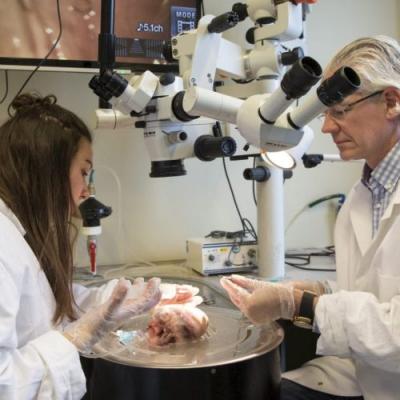
October 11, 2022 — The preliminary results of the first-in-human (FIH) trials for the innovative ELANA Heart Bypass Solution have been unveiled today and look promising.
At the 36th EACTS Annual Meeting Late Breaking Trials session, Drs. Patrick Klein, cardiothoracic surgeon the St. Antonius Hospital, Nieuwegein, The Netherlands, and Dr. Bart van Putte, principal investigator of the SAFE-CAB trial, announced that the 30-day post-operative outcomes of the open procedure showed 100% of patients to be free of Major Adverse Cardiovascular Events (MACE). In all cases there was no cardiac related mortality or myocard infarction, and no need to repeat the coronary revascularization.
This news marks an important landmark for the ELANA (Excimer Laser Assisted Non-Occlusive Anastomosis) Heart Bypass Solution and its developer, AMT Medical. In future, this innovative medical device should help facilitate the broader use of minimally invasive bypass surgery techniques. This in turn provides an alternative to traditional, gold standard, sutured (hand-sewed) CABG (Coronary Artery Bypass Grafting) surgery. If needed, the ELANA Heart Bypass Solution can also be used for CABG procedures.
The trial is now set to be expanded to include a further 65 patients by mid-2023. Said Drs. Klein: “Having operated together on the first 10 patients, Dr. van Putte and I concluded that the ELANA Heart Bypass Solution proved to be safe and feasible in human application. We are now ready to go to the second stage of the SAFE-CAB trial to confirm these results in a broader range of patients with a longer follow-up - including graft patency assessment by coronary angiography after one year. These results will be used to achieve a European registration for the commercial use of this solution.”
Coordinating investigator Prof. Dr. Stephan Jacobs from the German Heart Center Berlin, Germany, believes that this trial could change the game for minimally invasive heart CABG surgery - which has traditionally been technically demanding for the surgeon. “A sutureless coronary anastomosis device like the ELANA Heart Bypass Solution could effectively facilitate minimally invasive CABG,” he said.
“This technology already has proof of concept in brain surgery; now the objective is to gather even more clinical data from this SAFE-CAB study that demonstrate its safety and preliminary efficacy in heart surgery.”
According to Rutger Tulleken, CEO of AMT Medical, these trial results represent positive news for both surgeons - and their patients. “The ELANA Heart Bypass Solution uses a clip to connect the donor vessel behind the site of the blockage – which is then opened, allowing blood to flow through the newly made path. This clip has a major advantage over hand suturing because this connection is reproducible, and thus requires less time and skills from the surgeon,” he said.
Tulleken continued: “For patients, it will mean less chance of infections, internal bleeding and stroke; as well as a much shorter recovery time. Once the small incision is healed, the patient can return to living a normal life.” He concluded: “Our goal is simple; to complete these first-in-human trials – and ultimately make this technology commercially available for minimal invasive CABG procedures within several years.”
For more information: https://amt-medical.nl/


 February 03, 2026
February 03, 2026 









